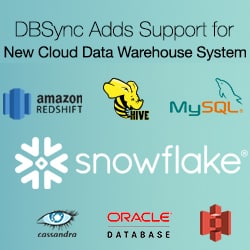DBSync Cloud Replication Adds Support for New Cloud Data Warehouse System
DBSync Cloud Replication Adds Support For New Cloud Data Warehouse System
Combine the power of data warehousing with the essential customer data from CRM and databases, distributed across on-premises, cloud systems, and other tools to drive cutting-edge analytics.
SAN FRANCISCO, CA. March 18, 2020
 DBSync, a leading technology company providing a modern data integration solution, announces support for Snowflake, a cloud data warehouse. DBSync expands the scope of actions for Snowflake customers, allowing them to perform the following:
DBSync, a leading technology company providing a modern data integration solution, announces support for Snowflake, a cloud data warehouse. DBSync expands the scope of actions for Snowflake customers, allowing them to perform the following:
- Replicating Salesforce or OData sources, like Microsoft Dynamics 365, across multiple Snowflake or AWS S3 or RedShift accounts for easy and quick setup of cloud-based data warehouses and data lakes.
- Configure Salesforce or OData source replication and restore to one or more Snowflake, AWS S3 or RedShift accounts for business continuity and disaster recovery.
- Import data from Snowflake, AWS S3 or RedShift databases into Salesforce or OData supporting applications and keep the database objects and stored data synchronized.
“Snowflake’s mission, to enable every organization to be data-driven, coincides very well with our calling as well,” said Rajeev Gupta, DBSync CEO. “For enterprise-level companies, it is critical to recognize an interdependent and critical part that plays an agile data warehouse together with Extract/Transfer/Load (ETL) process of data integration.” He added, “most data warehouses are now multiplatform data architectures, distributed across on-premises and cloud systems…integrating numerous, diverse datasets and platforms into a cohesive architecture is a difficult, but essential project for any org to fuel their management team with data-driven insights.”
Benefits of Cloud Data Warehousing Using Snowflake, AWS S3 or Redshift
1. Performance and Speed
- To speed up data loading process and run a high volume of queries, users can scale up their virtual warehouse to take advantage of extra compute resources.
2. Storage and Support Structured Data
- Users can combine structured data for analysis and load it into the cloud database without the need for conversion or transformation into a fixed relational schema first.
3. Reduce Concurrency Issue
- Queries from one virtual warehouse never affect the queries from another, and each virtual warehouse can scale up or down as required.
- It also allows organizations to seamlessly share data with any data consumer, whether they are a Salesforce customer or not.
About DBSync
DBSync is a leading provider of data management, replication, and application integration for CRM (Salesforce, Microsoft Dynamics 365 and more), Accounting (QuickBooks Desktop and Online, Microsoft Dynamics GP & NAV), Warehouse Management Systems (SkuVault), popular databases (Oracle, SQL Server, MySQL, MongoDB, S3, etc), and data integration markets. With easy to use pre-built maps and powerful Extract, Transform, and Load (ETL) capabilities, DBSync enables users to link information between leading Cloud and On-premise based CRM, hospital asset and case management, and accounting applications, along with support for on-premise applications running databases. DBSync provides support, training and consulting services for its integration solutions and is headquartered in Nashville, Tennessee, with centers in San Francisco, CA and Bangalore, India.
For more information on the Data Management Platform, please visit, DBSync.
All trademarks are owned by their respective companies.